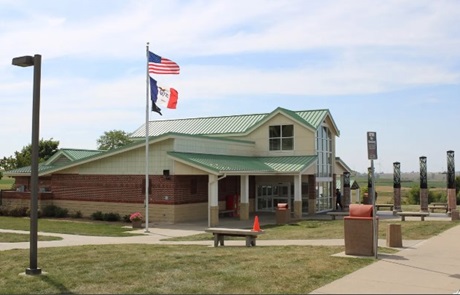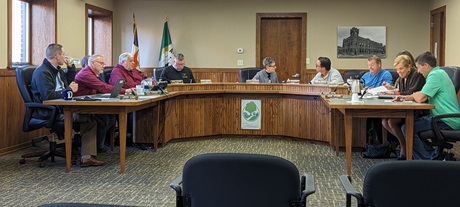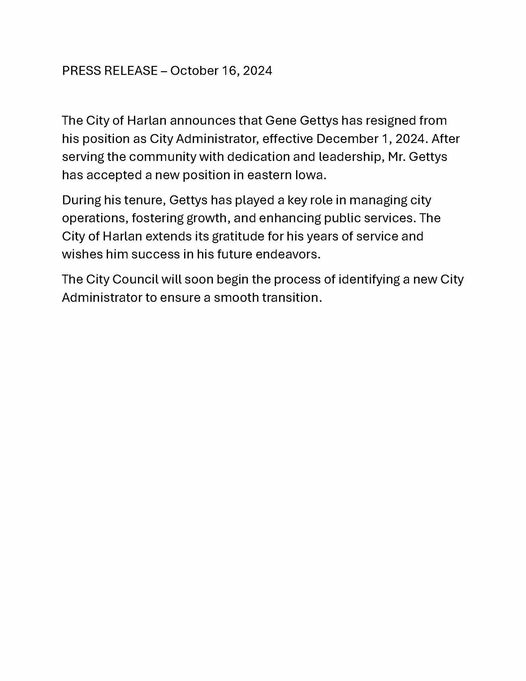KJAN News can be heard at five minutes after every hour right after Fox News 24 hours a day!
Keep up-to-date with Fox News Radio, Radio Iowa, Brownfield & the Iowa Agribusiness Networks!

KJAN News can be heard at five minutes after every hour right after Fox News 24 hours a day!
Keep up-to-date with Fox News Radio, Radio Iowa, Brownfield & the Iowa Agribusiness Networks!
(Iowa News Service The blue-and-white highway sign for the eastbound rest stop near here displays more than the standard icon of a person in a wheelchair, indicating facilities are accessible to people who can’t walk. The sign also shows a person standing behind a horizontal rectangle, preparing to perform a task. The second icon signals that this rest area along Interstate 80 in western Iowa has a bathroom equipped with a full-size changing table, making it an oasis for adults and older children who use diapers because of disabilities.
“It’s a beacon of hope,” said Nancy Baker Curtis, whose 9-year-old son, Charlie, has a disability that can leave him incontinent. “I’m like, ‘Oh my gosh, we’re finally there.’” The white changing table is 6 feet long and can be lowered and raised with a handheld controller wired to an electric motor. When not in use, the table folds up against the wall.
The table was recently installed as part of a national effort to make public bathrooms more accessible in places like airports, parks, arenas, and gas stations. Without such options, people with disabilities often wind up being changed on bathroom floors, in cars, or even on the ground outside.
Many families hesitate to go out because of the lack of accessible restrooms. “We all know somebody who’s tethered to their home by bathroom needs,” Baker Curtis said. She doesn’t want her son’s life to be limited that way. “Charlie deserves to be out in the community.” She said the need can be particularly acute when people are traveling in rural areas, where bathroom options are sparse.
Baker Curtis, who lives near Des Moines, leads the Iowa chapter of a national group called “Changing Spaces,” which advocates for adult-size changing tables. The group offers an online map showing scores of locations where they’ve been installed. Advocates say such tables are not explicitly required by the federal Americans with Disabilities Act. But a new federal law will mandate them in many airports in coming years, and states can adopt building codes that call for them. California, for example, requires them in new or renovated auditoriums, arenas, amusement parks, and similar facilities with capacities of at least 2,500 people. Ohio requires them in some settings, including large public facilities and highway rest stops. Arizona, Illinois, Maryland, Minnesota, and New Hampshire also have taken steps to require them in some public buildings.
Justin Boatner of Arlington, Virginia, advocates for more full-size changing tables in the Washington, D.C., area. Boatner, 26, uses a wheelchair because of a disability similar to muscular dystrophy. He uses diapers, which he often changes himself.
He can lower an adjustable changing table to the height of his wheelchair, then pull himself onto it. Doing that is much easier and more hygienic than getting down on the floor, changing himself, and then crawling back into the wheelchair, he said.
Boatner said it’s important to talk about incontinence, even though it can be embarrassing. “There’s so much stigma around it,” he said. He said adult changing tables are still scarce, including in health care facilities, but he’s optimistic that more will be installed. Without them, he sometimes delays changing his diaper for hours until he can get home. That has led to serious rashes, he said. “It’s extremely uncomfortable.”

The I-80 rest stop near Adair was one of the first in the state to include an adult-size changing table. (Photo: Tony Leys.KFF Health News)
Iowa legislators in recent years have considered requiring adult changing tables in some public restrooms. They declined to pass such a bill, but the discussion made Iowa Department of Transportation leaders aware of the problem. “I’m sorry to say, it was one of those things we’d just never thought of,” said Michael Kennerly, director of the department’s design bureau.
Kennerly oversees planning for rest stops. He recalls an Iowan telling him about changing a family member outside in the rain, with only an umbrella for shelter. Others told him how they changed their loved ones on bathroom floors. “It was just appalling,” he said.
Iowa began installing adult changing tables in rest stops in 2022, and it has committed to including them in new or remodeled facilities. So far, nine have been installed or are in the process of being added. Nine others are planned, with more to come, Kennerly said. Iowa has 38 rest areas equipped with bathrooms. Kennerly estimated it costs up to $14,000 to remodel an existing rest-stop bathroom to include a height-adjustable adult changing table. Incorporating adult changing tables into a new rest stop building should cost less than that, he said.
Several organizations offer portable changing tables, which can be set up at public events. Some are included in mobile, accessible bathrooms carried on trailers or trucks. Most permanent adult changing tables are set up in “family restrooms,” which have one toilet and are open to people of any gender. That’s good, because the act of changing an adult is “very intimate and private,” Baker Curtis said. It’s also important for the tables to be height-adjustable because it’s difficult to lift an adult onto a fixed-height table, she said.
Advocates hope adult changing tables will become nearly as common as infant changing tables, which once were rare in public bathrooms. Jennifer Corcoran, who lives near Dayton, Ohio, has been advocating for adult changing tables for a decade and has seen interest rise in recent years. Corcoran’s 24-year-old son, Matthew, was born with brain development issues. He uses a wheelchair and is unable to speak, but he accompanies her when she lobbies for improved services.
Corcoran said Ohio leaders this year designated $4.4 million in federal pandemic relief money to be distributed as grants for changing-table projects. The program has led to installations at Dayton’s airport and art museum, plus libraries and entertainment venues, she said. Ohio also is adding adult changing tables to rest stops. Corcoran said those tables are priceless because they make it easier for people with disabilities to travel. “Matthew hasn’t been on a vacation outside of Ohio for more than five years,” she said.
Kaylan Dunlap serves on a committee that has worked to add changing-table requirements to the International Building Code, which state and local officials often use as a model for their rules. Dunlap, who lives in Alabama, works for an architecture firm and reviews building projects to ensure they comply with access standards. She expects more public agencies and companies will voluntarily install changing tables. Maybe someday they will be a routine part of public bathrooms, she said. “But I think that’s a long way out in the future, unfortunately.”
(Atlantic, Iowa) – The City Council, today (Wednesday), approved a request from officials with Vision Atlantic, for a letter of support. Mayor Grace Garrett said no action would be needed by the Council during the meeting, it was being done though, with unanimous consent.
Officials with the non-profit Vision Atlantic say were asking for the letter “to support and strengthen some of [their] federal funding and various grant application [they] have submitted to date.” In addition, the organization says “As our donations and pledges continue to raise, we are getting close to the threshold where [the] grant committee can start to apply for some other key grants (some have a minimum percentage of the project needed to be secured before applications can be submitted). To date, the organization has assembled approximately 139 other letters of support for future grant applications.
Jackie Sampson spoke with regard to those applications…
In other business, the Atlantic City Council acted on approving an Order to have City Administrator John Lund execute a purchase order for an ambulance from Braun Northwest. Cass EMS, the City’s ambulance service exists as a 28E Agreement with costs being split evenly between the City of Atlantic, Cass Health, and Cass County. According to John Lund, “We are in a financially unsustainable commitment with Cass EMS. Over a period of five years, expenditures have increased 1,197%. This increase has occurred even with the generous contribution of a brand-new ambulance for Cass Health.”

Atlantic City Council, 10-15-24
City Councilman Sean Sarsfield said if the order was placed immediately, the new ambulance should arrive by late January or early February, 2025. Councilperson Elaine Otte and others mentioned EMS crews were very impressed with the ambulance’s design and functions.
Councilman Brink said EMS personnel mentioned it was the “best riding one they’d ever been in.” Sean Sarsfield said also, “Cost-wise…the price is probably the best that you can get,” compared to other ambulances. The Council thanked Atlantic Firefighter/Paramedic John Johnson for his role in helping to acquire the new ambulance.
In other business, the Atlantic City Council passed the Second Reading of an Ordinance prohibiting previously mentioned trees from being planted, due to the specified varieties’ lack of disease infestation, and storm damage, resistance. The First Reading was passed during the Council’s meeting on October 2nd. The list of trees was approved by Trees Forever and the Iowa Department of Natural Resources.
And, toward the end of Wednesday’s meeting, Mayor Grace Garrett declared Halloween Trick-or Treating will take place in Atlantic on October 31st, from 5-until 7-p.m., with downtown trick-or-treating from 3:30-until 5-p.m. Also, the next Ward Listening date will take place November 14th at the Atlantic Public Library, for residents in Ward 2, and anyone else who wishes to attend. The session begins at 5-p.m.
Other ward listening sessions are in the works. A meeting for citizens in the 4th Ward was held in June.
(Red Oak, Iowa) — Sheriff’s deputies in Montgomery County arrested man Wednesday morning for Violating the terms of his probation. Authorities says 46-year-old Chad Michael Hill, of Villisca, was arrested in the 400 block of 5th Street in Villisca, at around 9:45 a.m.
Hill was being held in the Montgomery County Jail on a $2,000 bond.
(Radio Iowa) – A central Iowa man will spend nine years in prison on fraud and money laundering charges. Court documents show 52-year-old William Berg of Waukee got 17 people to invest in W. Holdings of Iowa and Excel Performance Management, two companies he created and controlled. He created fake investment agreements, account statements, and a website to get their money, and then spent it on himself.
Investigators say Berg attempted to destroy documents one he learned of his federal indictment. He was given the nine-year prison sentence and ordered to pay more than one-point-six million dollars ($1.6) in restitution.
(Radio Iowa) – The Iowa Attorney General’s Office is proposing an update to state rules that outline the standards for nurses who are certified to conduct sexual assault examinations — and those who are not certified to collect rape kit evidence would no longer be eligible for state reimbursement for conducting the exam. Susan Krisco, the Deputy Attorney General for Criminal Justice, says the goal is to ensure any evidence collected is admissible in court.
“There are a number of people out there that believe that they can do these because it seems to be a checklist. You get a box and there’s a number of things that it says you should do,” Krisko says. “…However, the standards of a sexual assault nurse examiner are far more intricate.” Krisko says an emergency room doctor typically spends between 20 and 25 minutes with a patient, while an exam to collect evidence of a sexual assault takes three to four hours.
“Because we’re treating them with trauma informed care that an emergency room doctor doesn’t have the time or the training to do,” Krisko says. Amy Campbell, a spokesperson for the Iowa Nurses Association, says the standards for nurse examiners outlined in the new rules are appropriate.
“Nurses aren’t trained in forensics,” Campbell says. “A lot of doctors aren’t trained in forensics and the importance of ensuring that the qualify of the text, information that’s collected is going to stand up in court is what’s really important.” Attorney General Brenna Bird is asking legislators to raise the reimbursement rate for nurses who are certified to conduct sexual assault exams and, for the first time, provide mileage reimbursement.
Campbell says that’s important to the Nurses Association because the current 400-dollar payment is too low. “We have nurses that do this basically because it’s the right thing to do and they’re losing money on it,” Campbell says. “…They’re not getting reimbursed for their transportation. They’re getting paid below what their rates would be for a four or five hour examination.”
To get certified as a sexual assault exam nurse, a nurse must complete 40 hours of training which can be completed online or in person.
(Harlan, Iowa) – Officials with the City of Harlan have announced the resignation of City Administrator Gene Gettys. The announcement was posted on social media Wednesday afternoon:


Anthony Owens
(Radio Iowa) – Iowans can be very generous with their donations when disaster strikes elsewhere, but they’re warned to look very closely before they leap into sending any money toward hurricane relief.
Lisa Schiller, spokeswoman for the Better Business Bureau, says it’s wise to work with established agencies like the Red Cross which can be trusted to deliver help to places like Florida and North Carolina.
“See if the disaster relief charity that you are interested in has an on-the-ground presence in the impacted areas,” Schiller says. “Unless they already have staff there, honestly, it may be difficult to provide quick assistance.”
Schiller says the best way to help most organizations is often with money, since it can be hard to transport in-kind gifts to areas with ruined roads and no infrastructure. That’s especially true after the widespread and severe damage caused by Hurricanes Helene and Milton.
“A lot of people in times like this want to donate clothing or food or other types of donations,” she says, “and this may not actually be the best way to help unless the charity has the ability to properly distribute this type of aid.”
Criminals will try to prey on people’s good will during disasters, so Schiller says to be very cautious if you get a random phone call or social media message seeking donations.
“Go to their website, make sure that they’re legitimate,” she says. “A lot of times we see charities that pop up that have very similar names to legitimate charities and there can be a lot of confusion.”
Schiller says a good way to find a reputable charity is on the BBB’s charity tracker, Give.org.
(Radio Iowa) – The C-E-O of the Casey’s Convenience store chain says customers are continuing to weather the economy with a few changes in spending. C-E-O Darin Rebelez says 75 percent of their customers are upper income, or make 50-thousand dollars or more a year. “We’re in a very affordable geography so that 50-thousand dollars goes a lot further in our footprint than it might in some other geographies,” he says. “So all that being said, in the upper end, we’re not seeing much change with the consumer. They’re visiting the store as frequently buying as they have historically bought.” Rebelez says those on the lower end of the economics have made some changes.
“We’re not seeing a change in frequency of visits, but we are seeing a change in decisions that they are making. In some cases, that basket is shrinking a little bit, so they may forego that one extra item that they might have bought,” Rebelez says. He says candy seems to be one area where customers are looking for more of a bargain.”One of the things I thought was interesting when we dug into this is that consumers have been trading out of candy because candy’s been a lot more expensive, particularly chocolate, with a rise in cocoa prices and shifting over to our fresh bakery products, like cookies and brownies, that sort of thing,” Rebelez says.”
It’s still a sweet indulgence, but about half of the cost on the prepared side, as it is on the candy side.” Rebelez says the candy trade off helps the customer and the company. “Those guests are looking for that indulgence. They still want to get it. They’re just finding a more affordable way to do that,” he says, “and we’ll take that trade all day long because the penny profit is better on our prepared side and the margins higher.”
Rebelez spoke at the company’s “Analyst Day” on Tuesday at their headquarters in Ankeny. Casey’s operates around 26-hundred stores in 17 states, with most of the stores in the Midwest.
(Red Oak, Iowa) – Police in Red Oak say no one was injured during a collision Tuesday morning at N. 4th Street and E. Sunset Avenue. Authorities report a 2012 Jeep Grand Cherokee driven by 63-year-old Judith Hardy, of Red Oak, was traveling south on N. 4th Street and approaching E. Sunset Avenue, at around 9:35-a.m. A 2020 Ford EcoSport SUV driven by 84-year-old Karen Blue, of Red Oak, was stopped at the intersection yield sign, waiting for Hardy to turn.
When Hardy turned too soon and cut the corner short, her vehicle struck the Ford on the left front side. Both vehicles were driveable afterward. Damage from the collision amounted to a police estimated $4,000 altogether. Red Oak Police cited Hardy for making an improper turn.